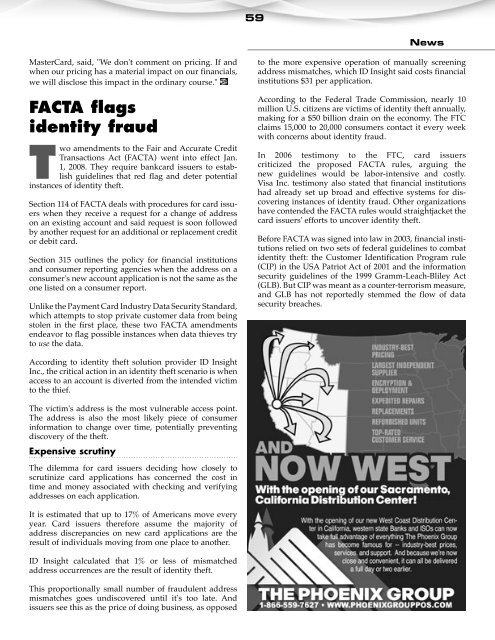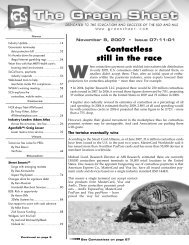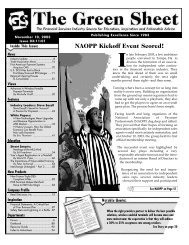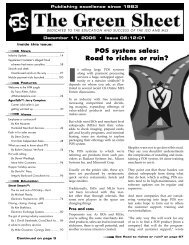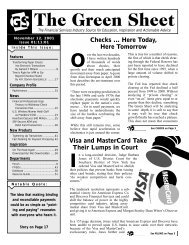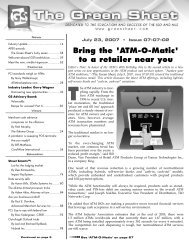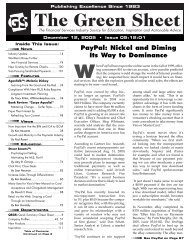View PDF of this issue - The Green Sheet
View PDF of this issue - The Green Sheet
View PDF of this issue - The Green Sheet
You also want an ePaper? Increase the reach of your titles
YUMPU automatically turns print PDFs into web optimized ePapers that Google loves.
59<br />
News<br />
MasterCard, said, "We don't comment on pricing. If and<br />
when our pricing has a material impact on our financials,<br />
we will disclose <strong>this</strong> impact in the ordinary course."<br />
FACTA flags<br />
identity fraud<br />
Two amendments to the Fair and Accurate Credit<br />
Transactions Act (FACTA) went into effect Jan.<br />
1, 2008. <strong>The</strong>y require bankcard <strong>issue</strong>rs to establish<br />
guidelines that red flag and deter potential<br />
instances <strong>of</strong> identity theft.<br />
Section 114 <strong>of</strong> FACTA deals with procedures for card <strong>issue</strong>rs<br />
when they receive a request for a change <strong>of</strong> address<br />
on an existing account and said request is soon followed<br />
by another request for an additional or replacement credit<br />
or debit card.<br />
Section 315 outlines the policy for financial institutions<br />
and consumer reporting agencies when the address on a<br />
consumer's new account application is not the same as the<br />
one listed on a consumer report.<br />
Unlike the Payment Card Industry Data Security Standard,<br />
which attempts to stop private customer data from being<br />
stolen in the first place, these two FACTA amendments<br />
endeavor to flag possible instances when data thieves try<br />
to use the data.<br />
to the more expensive operation <strong>of</strong> manually screening<br />
address mismatches, which ID Insight said costs financial<br />
institutions $31 per application.<br />
According to the Federal Trade Commission, nearly 10<br />
million U.S. citizens are victims <strong>of</strong> identity theft annually,<br />
making for a $50 billion drain on the economy. <strong>The</strong> FTC<br />
claims 15,000 to 20,000 consumers contact it every week<br />
with concerns about identity fraud.<br />
In 2006 testimony to the FTC, card <strong>issue</strong>rs<br />
criticized the proposed FACTA rules, arguing the<br />
new guidelines would be labor-intensive and costly.<br />
Visa Inc. testimony also stated that financial institutions<br />
had already set up broad and effective systems for discovering<br />
instances <strong>of</strong> identity fraud. Other organizations<br />
have contended the FACTA rules would straightjacket the<br />
card <strong>issue</strong>rs' efforts to uncover identity theft.<br />
Before FACTA was signed into law in 2003, financial institutions<br />
relied on two sets <strong>of</strong> federal guidelines to combat<br />
identity theft: the Customer Identification Program rule<br />
(CIP) in the USA Patriot Act <strong>of</strong> 2001 and the information<br />
security guidelines <strong>of</strong> the 1999 Gramm-Leach-Bliley Act<br />
(GLB). But CIP was meant as a counter-terrorism measure,<br />
and GLB has not reportedly stemmed the flow <strong>of</strong> data<br />
security breaches.<br />
According to identity theft solution provider ID Insight<br />
Inc., the critical action in an identity theft scenario is when<br />
access to an account is diverted from the intended victim<br />
to the thief.<br />
<strong>The</strong> victim's address is the most vulnerable access point.<br />
<strong>The</strong> address is also the most likely piece <strong>of</strong> consumer<br />
information to change over time, potentially preventing<br />
discovery <strong>of</strong> the theft.<br />
Expensive scrutiny<br />
<strong>The</strong> dilemma for card <strong>issue</strong>rs deciding how closely to<br />
scrutinize card applications has concerned the cost in<br />
time and money associated with checking and verifying<br />
addresses on each application.<br />
It is estimated that up to 17% <strong>of</strong> Americans move every<br />
year. Card <strong>issue</strong>rs therefore assume the majority <strong>of</strong><br />
address discrepancies on new card applications are the<br />
result <strong>of</strong> individuals moving from one place to another.<br />
ID Insight calculated that 1% or less <strong>of</strong> mismatched<br />
address occurrences are the result <strong>of</strong> identity theft.<br />
This proportionally small number <strong>of</strong> fraudulent address<br />
mismatches goes undiscovered until it's too late. And<br />
<strong>issue</strong>rs see <strong>this</strong> as the price <strong>of</strong> doing business, as opposed


